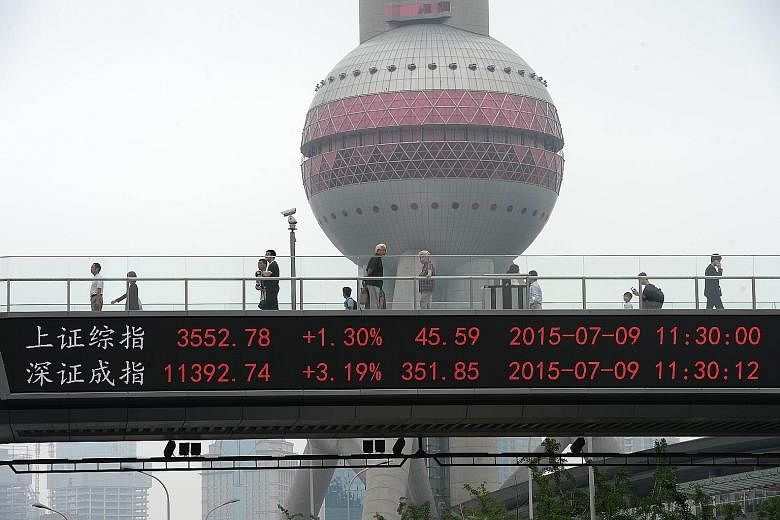LONDON • When emerging markets economist Alex Wolf at Standard Life Investments met Chinese securities regulators in March, they had a clear message: China is enacting free-market reforms needed to lure foreign investors and gain entry to MSCI's global indexes.
Now, after a week of unprecedented state intervention to prop up local markets, it's clear to Mr Wolf that reform has taken a back seat to easing the pain from a rout that many say was inevitable.
International investors at Aberdeen Asset Management and Clough Capital Partners say market meddling threatens to further delay MSCI inclusion. The index provider left China's domestic shares out of its equity gauges last month.
"Recent reforms were meant to create a more professional and mature market. Intervention definitely undermines that view," said Mr Wolf, whose firm oversees US$380 billion (S$514 billion) in funds. "It could be harder in the future to attract more offshore capital."
The Shanghai Composite Index rallied 152 per cent in the year to June 12 but, even then, foreigners were cautious about entering a market where individual investors account for 80 per cent of trading.
On Thursday, even amid the largest rally since 2009, they sold shares through Shanghai's exchange link with Hong Kong, extending a four-day outflow, according to data compiled by Bloomberg. Yesterday, the Shanghai Composite closed 4.5 per cent higher.
Phone calls and e-mail messages to MSCI officials in London and New York were not answered. Ms Fennie Wong, an official in Hong Kong for index provider FTSE, could not give comments immediately.
"What has happened gives opponents a reason to lobby against the inclusion as it's not market-driven," said China equities head Nicholas Yeo at Aberdeen.
The Chinese authorities are keen on an MSCI endorsement as it would help raise the status of mainland markets worldwide and make the yuan a more global currency.
MSCI said last month it would work with Chinese regulators to establish policies that resolve the "remaining accessibility issues". They include giving investors quotas that match the size of their assets under management and greater clarity in share ownership rules.
However, in the meantime, China's record-breaking equity boom has turned into a bust. To stop the rout, the authorities have suspended initial public offerings, restricted bearish bets via stock-index futures and banned major shareholders from selling shares.
To stop the barrage of sell orders, local exchanges have allowed more than 1,400 companies to halt trading in their shares.
"By intervening in the market, they are creating more uncertainty," said Mr Jorge Mariscal, chief investment officer for emerging markets at UBS Wealth Management.
The issue of adding mainland equities to MSCI gauges has divided fund managers. MSCI's main consideration is whether foreign investors can freely access yuan-denominated A shares, said senior portfolio manager Li Shanquan at OppenheimerFunds. On that front, there are signs of improvement.
Macquarie Asset Management portfolio manager Sam Le Cornu, who oversees US$3 billion in Asian equities, says the extreme volatility in Chinese shares is "the key hurdle to the inclusion". BLOOMBERG

